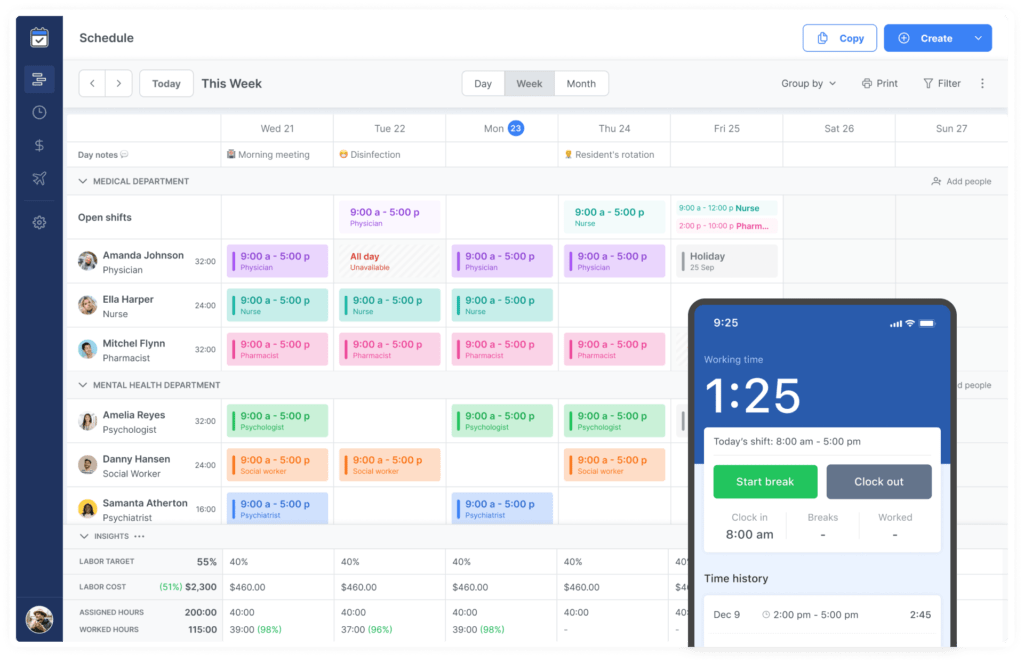In healthcare, where patient needs never stop, one truth is becoming impossible to ignore – scheduling is everything. From avoiding burnout to improving patient outcomes, the way nurses’ shifts are planned defines the health of the entire organization.
A new study from NYU Rory Meyers College of Nursing, published in the Western Journal of Nursing Research, reveals how flexibility, transparency, and autonomy in scheduling can significantly improve job satisfaction and retention. The findings echo what many healthcare leaders already feel daily: staff scheduling isn’t just an administrative task, it’s a strategic function.
“Nurses are innovators by nature, and scheduling is one less-considered area where they can innovate,” says Amy Witkoski Stimpfel, the study’s lead author. “Collaborating with nurses to find schedules that work for them can help interrupt the cycle of dissatisfaction and turnover.”
The Human Cost of Poor Scheduling
Hospital and clinic schedules are a balancing act – managing 24/7 patient care, limited staff, and unpredictable needs. When shifts are inconsistent or inflexible, stress, burnout, and attrition rise quickly.
The NYU study found that nurses’ satisfaction with their schedules directly impacts their mental health, family life, and commitment to stay in their roles. Lack of input or unclear processes leads to resentment, while fair and flexible systems increase loyalty and teamwork.
For healthcare managers, the message is clear: improving scheduling isn’t just good for morale – it’s essential for keeping experienced nurses on staff and ensuring patients receive the care they deserve.
What Nurses Want from Scheduling
The study identified four major principles that shape satisfaction:
- Flexibility and control: Nurses want a say in when and how they work – from requesting specific days off to choosing consecutive vs. non-consecutive shifts.
- Transparency: Visibility into how schedules are built fosters fairness and trust.
- Equity: Balancing weekend, night, and holiday duties prevents burnout across the team.
- Unit autonomy: Allowing each department to adapt scheduling to its reality avoids the frustration of rigid, system-wide policies.
Even small improvements, such as enabling self-service time-off requests or experimenting with 4×10-hour shifts, can dramatically improve engagement.
Technology’s Role in Smarter Scheduling
The research also points to technology as a growing solution. Tools like employee scheduling software allow hospitals to combine organizational needs with individual preferences – a balance that manual spreadsheets rarely achieve.
Modern platforms like Shifts by Everhour give healthcare managers full visibility over who’s working, who’s available, and where gaps exist – all while empowering nurses to see their schedules, request swaps, or claim open shifts right from their phones.
With automated approvals, customizable rules, and real-time sync across departments, nurse managers can save hours every week while improving fairness and compliance.
The result? Less burnout, fewer last-minute calls, and a more balanced workload for everyone.
Why Scheduling Should Be a Strategic Priority
Scheduling affects everything – staffing costs, morale, retention, and patient care quality. Studies show that each time a nurse leaves, it can cost hospitals up to $50,000 in turnover and training costs. Investing in better scheduling processes and tools pays for itself many times over.
By building systems that value flexibility and autonomy – supported by technology that removes friction – healthcare organizations can stop reacting to scheduling chaos and start leading with intention.

How Shifts by Everhour Supports Healthcare Teams
Shifts by Everhour was built to make workforce scheduling simple, fair, and transparent. Designed for shift-based environments like hospitals, clinics, and care centers, it helps healthcare managers:
- Create equitable and flexible schedules in minutes
- Fill open shifts faster
- Allow staff to swap or request time off with manager approval
- Track attendance, overtime, and time off – all in one place
- Access everything on web or mobile, so communication never breaks
With Shifts, every nurse can see their schedule clearly and plan their life confidently – and every manager can focus on care, not paperwork.
Final Thought
Nurses deserve systems that work as hard as they do. The NYU study reinforces what frontline staff have long understood: a well-designed schedule is the foundation of a healthy workplace. By combining flexibility, fairness, and digital tools like Shifts by Everhour, healthcare organizations can build environments where both nurses and patients thrive.

